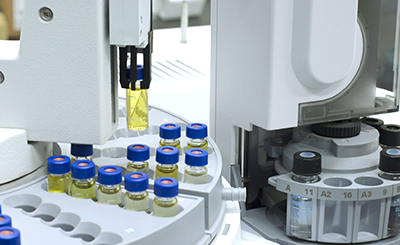Metabolites Can Reveal Genes Related to Medication Response
Abstract
Using metabolic profiles as biological surrogates for clinical response may help overcome some of the hurdles that have hampered pharmacogenomics studies in psychiatry.
When Richard Weinshilboum, M.D., first began studying breast cancer years ago, treatment options were limited. “It used to be treated basically one way, with cytotoxic chemotherapy,” he told Psychiatric News.

Assessing the concentrations of key metabolites in the blood may provide a biological surrogate for clinical assessments and help identify genes that may mediate a patient’s response to medications.
Today, however, it is standard practice for clinicians to run tests to determine the type of breast cancer a patient has to guide less indiscriminate treatment options, Weinshilboum, a professor of pharmacology at the Mayo Clinic, explained. For instance, breast cancer cells that have excess amounts of the HER2 receptor are treated with Herceptin, an antibody that specifically targets that receptor.
This is just one of several ways that researchers are using information about molecular markers present in many other tumor types to slow and destroy the cells. Tailoring treatments based on a patient’s genetic makeup is a step toward precision medicine, and one Weinshilboum hopes will become more commonplace in his other medical area of interest, psychiatry.
“So far, the application of powerful pharmacogenomics techniques in psychiatry has been a little disappointing,” he said.
There have been some intriguing findings, such as a recent study that identified a variant in a dopamine receptor gene linked with better antipsychotic response, he noted. But, more often than not, pharmacogenomic studies—particularly in the area of antidepressants—have been unable to uncover or subsequently validate genetic variants that might predict patients who will respond to medication, Weinshilboum said.
Such disappointment may in part be due to the fact that assessing how well a patient with a psychiatric disorder such as depression responds to medication can be both vague and subjective, explained Oliver Fiehn, Ph.D., a professor of molecular and cellular biology at the University of California, Davis. “But circulating in the blood we have countless metabolites that provide an objective, biological imprint of what’s going on in the brain,” he said.
That is where metabolomics, or specifically pharmacometabolomics, can provide guidance. Researchers can acquire metabolite profiles of patients who respond well to therapy, and then scan the genomes of those people with a favorable metabolic profile to find associated gene variants.
In an analysis published February 23 in Molecular Psychiatry, Weinshilboum and his colleagues described their analysis of the blood samples of 306 patients with major depressive disorder who initiated citalopram or escitalopram treatment. Blood was drawn before the patients started taking the selective serotonin reuptake inhibitors (SSRIs) and again four and eight weeks later.
The researchers analyzed 31 common plasma metabolites and found that patients who had higher baseline serotonin levels and experienced greater decreases in plasma serotonin concentrations following SSRI treatment also tended to have better clinical outcomes. When the research team carried out a genome-wide association study to find a genetic connection among patients with high baseline serotonin or large decreases in the concentration of serotonin following SSRI treatment, they uncovered two candidate genes—TSPAN5 and ERICH3.
As part of the same study, Weinshilboum’s group manipulated cells to knock out or overexpress these proteins. In both cases, altering the TSPAN5 and ERICH3 protein levels was associated with changes in how much serotonin was released by the cultured cells, suggesting that the variants of these genes could have a biological impact in the brain.
The findings “show how metabolomics can inform our genomic searches,” Weinshilboum said, adding that the patients were part of one of the previous studies that failed to identify genetic variants that predict response to medications using a standard clinical assessment (the Hamilton Depression Rating Scale).
Uncovering metabolites that predict response to SSRIs could teach researchers about more than SSRIs alone, Weinshilboum added: “These metabolic profiles are helping us understand the underlying biology of this terrible disorder, and that, in turn, may even help guide and accelerate the development of new antidepressant agents in addition to optimizing the use of current ones.”
Weinshilboum’s study was supported by multiple grants from the National Institute of General Medical Sciences. ■



